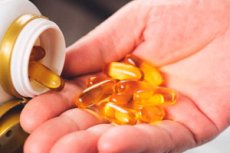New publications
Another study refutes the benefit of omega-3 supplements in dry eye syndrome
Last reviewed: 02.07.2025

All iLive content is medically reviewed or fact checked to ensure as much factual accuracy as possible.
We have strict sourcing guidelines and only link to reputable media sites, academic research institutions and, whenever possible, medically peer reviewed studies. Note that the numbers in parentheses ([1], [2], etc.) are clickable links to these studies.
If you feel that any of our content is inaccurate, out-of-date, or otherwise questionable, please select it and press Ctrl + Enter.

Supplements with re-esterified omega-3 fatty acid triglycerides did not improve symptoms of dry eye syndrome associated with meibomian gland dysfunction, according to results from a randomized trial in South Korea, adding to a growing body of evidence against the popular therapy.
Changes in ocular surface disease index (OSDI) from baseline to 6 and 12 weeks were -20.5 and -22.7 in the omega-3 fatty acid group and -15.1 and -18.8 in the grape seed oil control group (P=0.12 and P=0.28, respectively), reported Jun Young Hyun, MD, PhD, of Seoul National University in the Republic of Korea, and colleagues in JAMA Ophthalmology.
There were no changes in safety or adverse effects with dietary supplementation in either group.
"I don't think they work," said Penny A. Asbell, MD, MBA, of the University of Tennessee Health Sciences in Memphis. Asbell, who was not involved in the current study, led the landmark DREAM trial, which found no benefit from fish-derived omega-3 fatty acids compared with an olive oil placebo in patients with moderate to severe dry eye syndrome.
Dry eye syndrome may be one of the most common reasons patients seek eye exams, though exact numbers are difficult to track because it's not always documented in medical records, Asbell explained. While some patients report pain and vision problems, "they vary in how they describe not feeling quite right in their eyes."
Artificial tears are an old, tried-and-true treatment, but they don’t always solve the problem, Asbell noted. Several FDA-approved drugs are available, including immunomodulators that reduce inflammation on the surface of the eye, and many more are in development.
Researchers have been studying omega-3 supplements for dry eye syndrome for years, Asbell added, noting that patients often prefer to take over-the-counter fish oil supplements because they believe they are a natural product, but studies have repeatedly questioned their value.
Hjon and colleagues began this study as a follow-up to Asbell's 2018 study. They noted that studies have shown conflicting results on omega-3 fatty acids for dry eye syndrome, singling out a 2016 study that found a benefit from re-esterified omega-3 fatty acids.
In an invited commentary article, Ian J. Saldanha, MBBS, MPH, PhD, of the Johns Hopkins School of Public Health in Baltimore, noted that the study's findings are "generally consistent with most existing data."
However, he noted that the researchers linked some secondary outcomes, such as changes in upper and lower eyelid telangiectasia and the degree of eyelid margin epitheliopathy, to omega-3 supplements, suggesting that higher doses may be beneficial.
"In summary, more work may be needed before a firm conclusion can be reached in this area and the chapter on omega-3 fatty acid supplementation for patients with evaporative dry eye syndrome is completely closed," Saldanha wrote.
For her part, Asbell said the new study seemed reasonable, but she questioned why the control group was grapeseed oil, which the authors say has antioxidant properties and may protect the eye from oxidative stress. She also questioned whether the study participants were getting enough omega-3 fatty acids from their diets, and noted that dry eye syndrome itself is difficult to measure.
If dry eye patients want to try omega-3 supplements, Asbell said, the risks are limited, other than bleeding associated with high doses, and there may be a beneficial placebo effect. She also noted that patients should take several large capsules a day to reach the recommended doses.
For this double-blind, parallel study, investigators recruited 132 patients with meibomian gland dysfunction-associated dry eye at seven sites from September 2020 to January 2023. The average age of participants was 50.6 years, and 78% were women. The average baseline OSDI scores for the omega-3 fatty acid and grape seed oil groups were 43.5 and 44.1, respectively.
Patients were randomly assigned to receive four daily doses of 1,680 mg of eicosapentaenoic acid and 560 mg of docosahexaenoic acid (through a product called De3 Omega Benefits, manufactured by the study sponsor) or four daily doses of 3,000 mg of grapeseed oil.
A total of 58 and 57 patients in both groups completed the 12-week follow-up. There was no difference in dietary supplement compliance between groups (95.8% and 95.4%, respectively).
Hyon and his team reported no differences between the groups in eye drop use or average visual acuity.
Regarding limitations, the researchers noted that the study period was short, the sample size was small, and no placebo was used.
